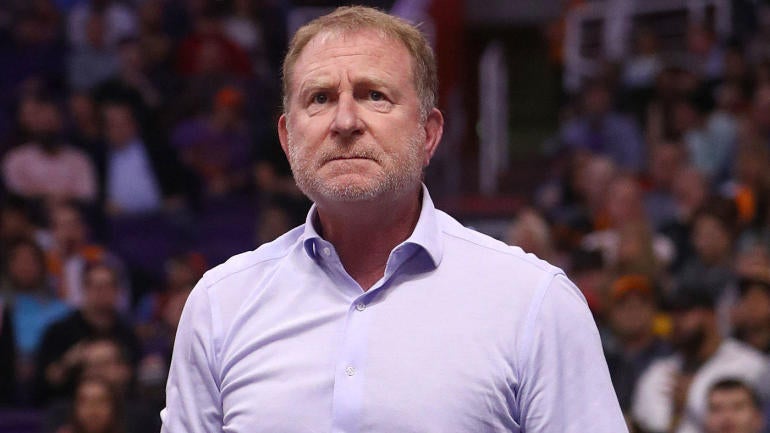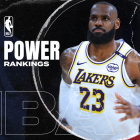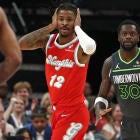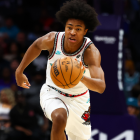
Phoenix Suns owner Robert Sarver, who is white, has said the N-word on multiple occasions; made lewd, misogynistic comments in meetings; berated coaches and presided over a toxic work environment in which employees have been discouraged from going to the human resources office, according to a wide-ranging story by ESPN's Baxter Holmes published Thursday.
The story quotes a Suns co-owner saying, "The level of misogyny and racism is beyond the pale. It's embarrassing as an owner." A former team executive added, "There's literally nothing you could tell me about him from a misogynistic or race standpoint that would surprise me."
The NBA announced an investigation into Sarver and the organization on Thursday.
"The allegations contained in today's ESPN article are extremely serious, and we have directed the Wachtell Lipton law firm to commence a comprehensive investigation," league spokesperson Mike Bass said in a statement. "The NBA and WNBA remain committed to providing a respectful and inclusive workplace for all employees. Once the investigation is completed, its findings will provide the basis for any league action."
In the ESPN story, a current Suns employee on the business side is directly quoted on the possibility of an investigation: "If the commissioner comes in and investigates to see what the f--- is going on in Phoenix, [he] would be appalled."
Among the incidents throughout Sarver's 17-year tenure reported by ESPN:
- Sarver repeatedly said the N-word in the coaches room after a loss against the Golden State Warriors in 2016, complaining that Draymond Green, who is Black, said it during the game. Then-coach Earl Watson told him, "You can't f---ing say that."
- At least six Suns employees described Sarver saying the N-word aloud when repeating something a Black player had said.
- In telling a Suns employee that he wanted to hire Lindsey Hunter, who is Black, instead of Dan Majerle, who is white, as coach in 2013, Sarver said, "These [N-words] need a [N-word]," according to an executive who heard the conversation.
- Sarver made a racially insensitive comment during Steve Nash's recruiting meeting in the summer of 2004. An executive in the room said, "We signed Steve Nash despite Robert."
- As the Suns tried to sign LaMarcus Aldridge in 2015, they knew that he would like to play near his children in Texas. Sarver said then that they needed to get Phoenix-area strippers pregnant with NBA-player children so the team could have an edge in recruiting. "A lot of the stuff he says is to get a big reaction," a former employee said. "And who's going to tell him that he can't? He speaks in threats. He likes that awkwardness. He likes people to know that he's in charge. He wants control. He wants control of every situation and every person."
- While involved in a contract dispute with Eric Bledsoe's agent, Rich Paul of Klutch Sports, Sarver threatened to fire Watson unless the coach, who was also represented by Klutch, ditched the agency. "It's almost like an ownership thing," Watson said. "He wants people to call him and beg him."
- During Watson's first season, the coach was asked to suggest areas in which the organization could improve. When he said that the Suns could use more diversity, Sarver responded, "I don't like diversity," according to Watson and a basketball operations employee, explaining that he believes diversity makes it more difficult for people to agree on things.
- A white executive called a Black coworker "Carlton" -- a reference to the character from "The Fresh Prince of Bel-Air" -- despite the coworker telling him multiple times to stop doing so, according to two ex-employees. The executive "jokingly" told his Black coworker to "do the Carlton" dance.
- Sarver made lewd comments in all-staff meetings, according to more than a dozen employees. Examples include talking about his wife performing oral sex on him and claiming that he wears extra-large condoms. "Women have very little value," said a woman who used to work for the team, describing how she felt when she was there. "Women are possessions. And I think we're nowhere close to where he thinks men are."
- In the team's training room, Sarver asked former Suns player Taylor Griffin, who was lifting weights, whether or not he shaves his legs. When Griffin answered in the affirmative, Sarver asked, "Do you shave your balls, too?" This was during the 2009-10 season, and, according to a Suns employee, Sarver asked the same question to others over the next several years. Griffin said, "At the time, I took it as a joke. Looking back on it in the context of today, for a leader of a company or the owner of a team to say such a thing is inappropriate."
- A woman who used to work for the Suns said that, after a male coworker physically assaulted her outside of the office, all the organization did was move her desk back one row. "I couldn't escape," she said. "It was a joke. An absolute joke." According to the female employee, her assaulter's desk remained less than 10 feet away.
- A former human resources representative said, "I would say [to employees seeking help], 'Let's go take a walk. Because if they see you being here, they're gonna come after you.'" Another former HR rep said that it was "sort of a culture of complicity. Which I was a part of. And I hate saying that."
- Sarver told a pregnant employee that she would not be able to stay in her role coordinating the 2009 All-Star Game because she would be breastfeeding and would need to be at home. According to two Suns employees, other members of the management team had to step in to rebuke the owner.
This is not an exhaustive list of the reported allegations. The story also includes several anecdotes of Sarver reacting inappropriately to Phoenix's performance on the court. "He was constantly meddling and trying to coach himself or go into the coaches' office and start drawing X's and O's on the board at halftime and tell them they need to do this, they need to do that," a longtime former employee said. Sarver did not answer questions about his interactions with the team.
On Thursday afternoon, former Suns player Vince Carter said on ESPN that he wasn't surprised by that aspect of the story, as he experienced something similar when he returned to Phoenix after his brief stint there. Carter said that, at halftime of a game between the Dallas Mavericks and the Suns in January of 2012, Sarver entered Phoenix's locker room, where he instructed the players to "take me out" and "put me on the ground."
Within the organization, there is support for an independent investigation into the Suns' workplace culture, according to two current employees who spoke with ESPN. "A lot of people view this as their chance to right this ship," one of them said. Both, however, said there is concern about potential retaliation.
The National Basketball Players Association released a statement that reads, "We are continuing to review the allegations in today's ESPN story. We view these allegations as serious and applaud the [NBA's] decision to conduct an investigation. We will defer any further comments until that process has been concluded."
Weeks before the story's publication, Sarver released a statement denying "any and all suggestions that I used disparaging language related to race or gender." In the story he specifically denied saying the N-word to Watson, saying anything inappropriate in the Nash meeting, making the comment about getting strippers pregnant to lure free agents, saying the N-word when discussing hiring Hunter and talking about his sex life with employees.
Sarver said that his problem with Watson working for Klutch was about a "conflict of interest," that he never told the pregnant employee that she couldn't continue in her role and that he only gave the picture of his wife in a bikini to employees in charge of merchandise, as she was wearing a sample and he wanted to know if they wanted to sell the item in the team shop. On the Griffin incident, he said he doesn't remember using "those exact words" but he did "make a joking reference to men's grooming habits with Taylor Griffin once in the locker room. I remember that Taylor laughed at my comment."
The white male executive who called his Black coworker "Carlton" denied being asked to stop doing so, said he never asked the coworker to dance and described their relationship as "jovial." While three people said that the female employee's desk had been moved following the alleged physical assault by a male coworker, the Suns denied telling anyone to move a desk and said that they couldn't take any action because neither employee spoke to HR. The female employee said that she had indeed talked to HR.
Post-publication, Sarver issued another second statement denying the allegations, in which he says, "I would entirely welcome an impartial NBA investigation which may prove our only outlet for clearing my name and the reputation of an organization of which I'm so very proud." He also said that the N-word is "not part of my vocabulary," that Watson is "not a credible source" and that ESPN's reporting is "false" and "misleading."
Watson, now an assistant coach for the Toronto Raptors, issued a statement through his current employer. It reads, in part: "I am not interested in engaging in an ongoing battle of fact. Instead, I want to applaud the courage of the numerous players, executives, and staffers for fighting toxic environments of racial insensitivity, sexual harassment, and micro-aggressions with their truth." Watson went on to say that "this has been a traumatic experience, one that has affected me profoundly, and I am not willing to relive it every day."
In addition to the Suns, Sarver owns the Phoenix Mercury and the Spanish soccer club Mallorca. Nash and former soccer player Stu Holden are also part of Mallorca's ownership group.
![[object Object] Logo](https://sportshub.cbsistatic.com/i/2020/04/22/e9ceb731-8b3f-4c60-98fe-090ab66a2997/screen-shot-2020-04-22-at-11-04-56-am.png)



















